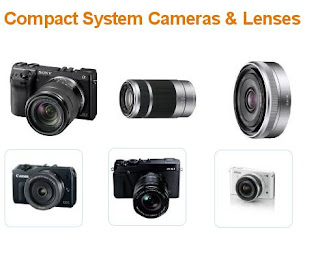
So, what are compact system cameras? Part point-and-shoot, part digital SLR, they deliver smaller form factors while maintaining many of the features—such as a larger sensor, and interchangeable lenses—that make a DSLR desirable. The technologies behind this performance vary; Panasonic Lumix G Series and Olympus PEN cameras share the Micro Four Thirds format, while Sony NEX, Nikon 1 System and other cameras feature one-of-a-kind systems.
What allows a compact system camera to be, well, compact? Unlike a digital SLR, there's no reflex mirror system inside, which is one reason these cameras are also called "mirrorless" or "mirrorless system cameras." That mirror has been replaced with an electric shutter system that requires less space; the smaller-than-a-DSLR body also allows for smaller lenses.
In addition to a significantly smaller form factor, camera manufacturers also focus on two other key benefits in their compact system cameras: style, and ease-of-use. Modern design, combined with color options not typically available with DSLRs, make Sony NEX, Panasonic Lumix G-Series, Nikon 1 System, and Olympus PEN digital cameras as stylish as they are capable. Intuitive interfaces, LCD touchscreens (on some models), and a variety of picture/movie modes and presets mean it's easier than ever to capture stunning photos and HD video.









Post a Comment